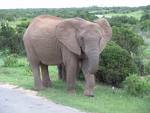Elephants Kept In Zoos Have Shorter Life-Span Than Wild Elephants
 A recent study conducted on the health and wellbeing of captive elephants, led by Georgia Mason of the University of Guelph has hit a blow on the faces of the Zoos that see themselves as a shelter for saving the endangered species.
A recent study conducted on the health and wellbeing of captive elephants, led by Georgia Mason of the University of Guelph has hit a blow on the faces of the Zoos that see themselves as a shelter for saving the endangered species.
The study, first of its kinds on the health of captive elephants, has put forward a surprising fact that elephants in Zoos die much younger than elephants in the wild. Furthermore, the study also claims that baby elephants born in captivity too have a shorter life span than those caught in the wild for the zoos.
The findings have come as a shock for those institutions, which had been trying to save the elephants from extinction though their captive-breeding programmes.
The first, unambiguous scientific proof has been put forward through a comparison of thousands of elephants kept in zoos and living wild in the national parks that keeping elephants in captivity not only damages their individual health but harms their reproductive potential.
The researchers who conducted the study said that an end should be put on capturing and importing of wild elephants from their native countries. Further a ban on the non-essential transfer of elephants from one zoo to another should be introduced. Breeding of elephants in captivity should only be allowed in zoos that can demonstrate good husbandry and welfare.
The latest findings have been published in the journal Science, and it will definitely act as an eye opener for the zoos in Britain, the rest of Europe and the United States, since the study could indicate a wider problem with other captive animals, such as rhinos and large carnivores.
“There has been little research into the welfare of zoo elephants. That is despite long-standing concerns that they suffer behavioral problems in captivity, such as pacing up and down and infanticide, as well as obvious physical signs of stress, such as lameness,” reported Georgia Mason.
Dr Mason added, “There have been suggestions that zoo elephants have quite short life spans compared to the elephants in the wild and, furthermore, the zoo populations, particularly in the US, consume rather than produce elephants, so that the populations are not self-sustaining.”
Mortality information was compared by the study on more than 4,500 African and Asian female elephants kept in zoos and living in the wild, either – in the case of the African species – in Amboseli national park in Kenya, or – in the case of the Asian elephant – in the Myanmar Timber Enterprise of Burma. Dr Mason informed, “In African elephants, zoo animals die earlier in adulthood than they do in Amboseli. In zoos, they are much less likely to make it into their thirties or forties and it seems that none has made it into their fifties so far.”
She concluded, “We found in Asian elephants that animals that are born and bred in zoos have a much shorter lifespan than those that are imported from the wild. This is incredibly counter-intuitive because you'd expect that those animals that have been, in effect kidnapped, to be more stressed, more scared of people or more frustrated, but instead they seem to live a reasonably long lifespan.”